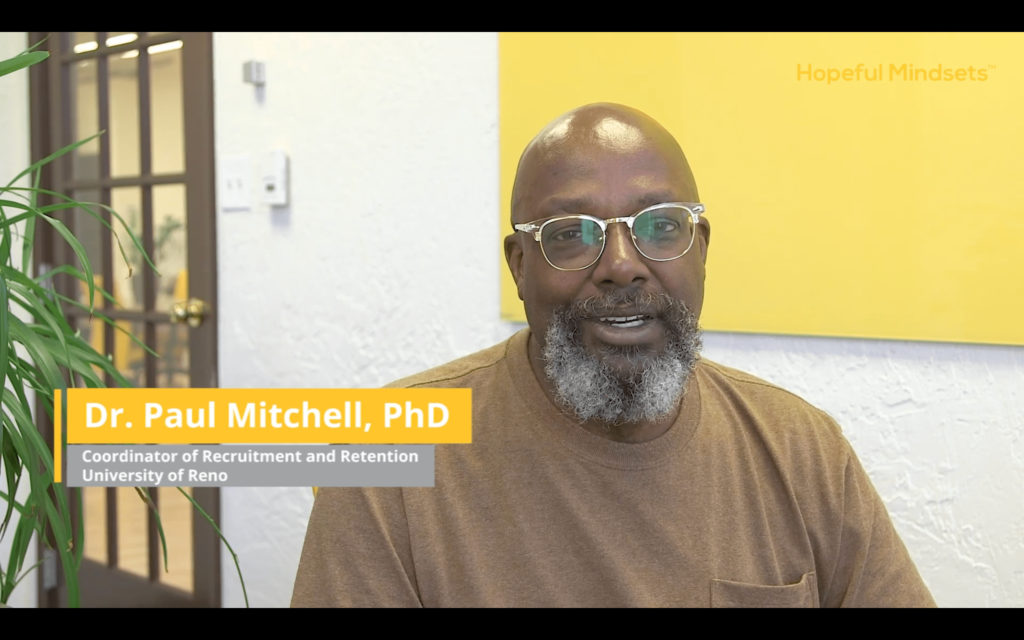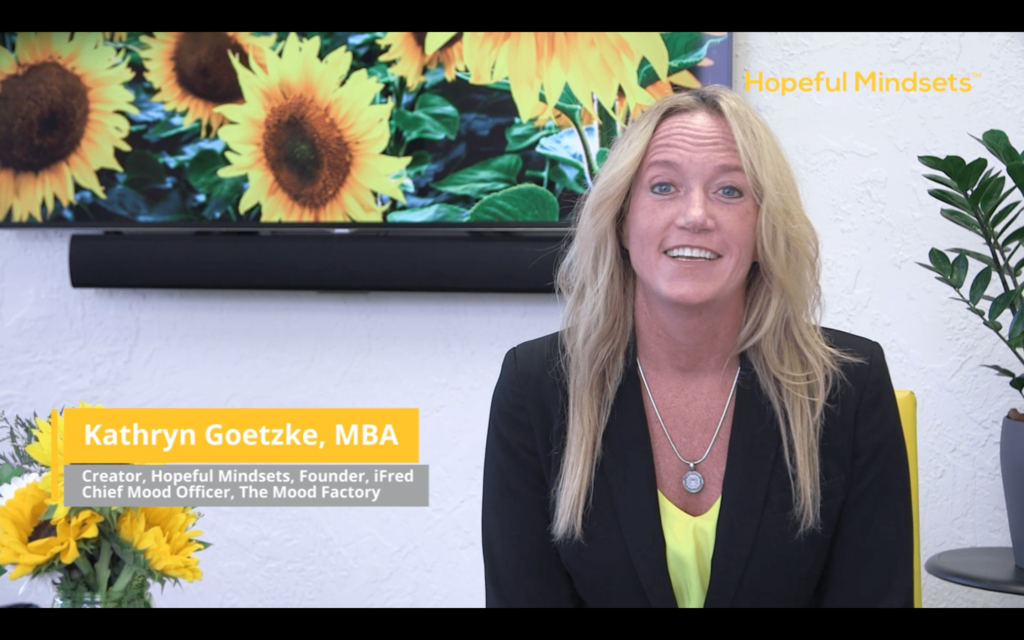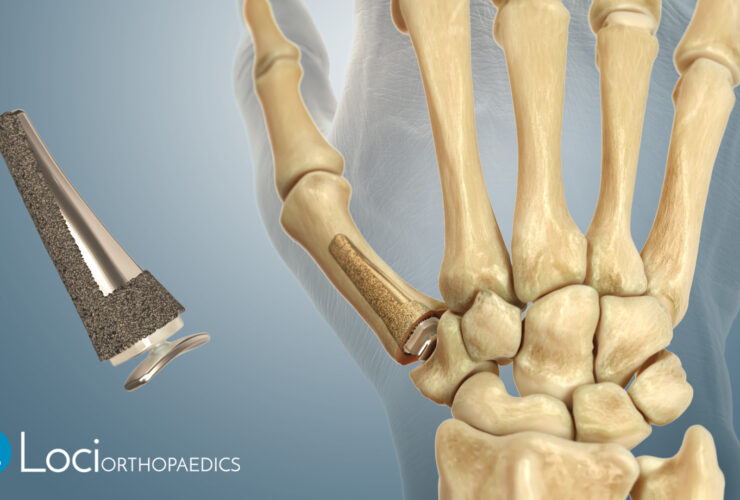Hopeful Mindsets Launches Globally to Improve Mental Health on College Campuses
Hopelessness plagues college students as schools return to session, the Science of Hope is needed now more than ever
Hopeful Mindsets™, a new course and proactive initiative designed to teach the “how-to” of hope, comes to college campuses as a way to address the emotional and psychological stressors that college students are facing today. Hopelessness is growing at unprecedented rates among youth and adults around the world and is a leading cause of suicide and primary symptom of depression. The JED Foundation found that 63% of students surveyed reported worsened mental health since before the pandemic. To provide support to college students, renowned mental health and wellness experts from top academic institutions and organizations around the world collaborated with The International Foundation of Research and Education (iFred) to help develop the Hopeful Mindsets course.

Hopeful Mindsets for the College Campus teaches students and educators how to proactively manage stress, channel emotions in a positive way, take inspired actions through goal setting, create strong and nourishing networks, eliminate challenges, and effectively create personal change for the better. The ten-lesson course teaches the science of happiness, mental wellness, connection, and hope. It is available to academic institutions to purchase for their entire campus and is also available to individuals for an $11 donation to iFred, a 501(c)(3) organization dedicated to ensuring all know how to get from hopelessness to hope. Individuals can also receive scholarships for the course. The program rolls out to students at the University of Nevada, Reno (UNR) this Fall, is being studied by researchers at Arizona State University’s (ASU) Center for the Advanced Study and Practice of Hope, and is available globally at www.hopefulmindsets.com.
Dr Crystal I. Bryce, PhD, Assistant Clinical Professor in The Sanford School and Associate Director of Research for the Center for the Advanced Study and Practice of Hope at ASU is overseeing the research being conducted.
“Our previous research has shown the importance of hope for college students’ retention,” said Dr Bryce. “Our research published in Learning and Individual Differences found that first-year, first-semester students who enter college with high hope are more likely to enrol in their second year of college.”
Hope impacts not just student mental health, but also student retention rates, which impacts a university’s bottom line.

“Hopelessness, that feeling of despair and sense of helplessness, is a normal part of life and something all of us experience. Yet we are never given a roadmap for how to get from hopelessness to hope,” says Kathryn Goetzke, Founder of iFred and Creator of Hopeful Mindsets. “It astounds me, as hopelessness is predictive of things like weapon carrying on school property, addiction, suicide, self-harm, violence, and early death, as well as a key symptom of anxiety and depression. How do we expect to solve any of these major challenges without teaching the ‘how-to’ of hope? That is what we initially set out to do with Hopeful Minds, a free global program for the K-6 population, and now with our new program Hopeful Mindsets for the College Campus.”
Dr Paul Mitchell, PhD, Professor of Journalism at UNR and Coordinator of Recruitment and Retention at the University of Nevada, Reno, was instrumental in bringing Hopeful Mindsets to the university’s campus.
“We need to ensure students have support, resources, and tools to maintain mental wellbeing, not just now, but always,” said Dr. Mitchell. “Teaching students hopefulness can help offset some of the struggles they are facing as a result of the pandemic, but also the pressures of college life they endure. Hopeful Mindsets is a great addition to core courses to help students learn to lead more positive lives.”
Hopeful Mindsets introduces the Five Keys of Hope, including Stress Skills, Happiness Habits, Inspired Actions, Nourishing Networks, and Eliminating Challenges. The course includes video and text lessons that combine interviews from world-renowned experts and real-life practical strategies and stories from recent college graduates that have overcome things like homelessness, mental health diagnoses, death, violence, and more. There is a guided coursebook to reinforce skills, lesson quizzes to track progress, and a hope community for support. There are tools available to help each campus launch the program, including a CANVAS page outline, syllabus, coursebook, templated marketing materials, social media campaigns, a suggested college resource map, and more.
“Hope is teachable, it’s learnable. I think we’ve learned that hope is something that people can embrace, that there are strategies for learning about hope, and for modifying how one approaches life to create a more hopeful mindset,” said Dr Myron Belfer, MD, MPA, Professor of Psychiatry in the Department of Psychiatry, Children’s Hospital Boston.
Hopeful Mindsets includes video lessons with compiled interviews and insights from more than 25 of the world’s leading experts in mental health, compassion, mindfulness, hope, happiness, and more. Hopeful Mindsets experts and collaborators include:
- Myron Belfer, MD, MPA, Professor of Psychiatry in the Department of Psychiatry, Children’s Hospital Boston, Harvard Medical School
- James Doty, MD, Director of the Center for Compassion and Altruism Research and Education at Stanford University School of Medicine
- Vikram Patel, PhD, co-founder of the Movement for Global Mental Health, the Centre for Global Mental Health at the London School of Hygiene & Tropical Medicine, the Mental Health Innovations Network, and Sangath, an Indian NGO which won the WHO Public Health Champion of India prize
- Thomas Lennon, Actor, Screenwriter, and Author
- Paul Mitchell, PhD, Coordinator of Recruitment and Retention at the University of Reno
- Chan Hellman, PhD, internationally renowned researcher for his work on building a hope centered response to trauma, and creator of the evidence-based framework Hope Centered and Trauma Informed
- Rachel S. Hertz, PhD of Brown University and Boston College, and world-renowned expert on the psychological science of smell
- Dan Tomasulo, PhD, TEP, MFA, MAPP, Academic Director at the Spirituality Mind Body Institute (SMBI) and author of Learned Hopefulness
- Robert Waldinger, MD, Director of the Harvard Study of Adult Development, one of the longest-running studies of adult life ever completed
- Jennifer S. Cheavens, PhD, Professor of Psychology at Ohio State University
- Crystal I. Bryce, PhD, Director of Research for the Hope Center, Arizona State University
- Erwin Benedict Valencia, DPT of the New York Knicks
- MJ Gottlieb, CEO of Loosid App
- Erin Michaela Brandt, MS with Appreciating Men
- Kelly Davis, Associate Vice President of Peer and Youth Advocacy, Mental Health America
- Martin Rafferty Chief Executive Officer and Founder, Youth Era
- Diane Dreher, PhD, Professor Emerita, Santa Clara University and lecturer in the Positive Psychology Guild in the United Kingdom
- Lian Zeitz, Advisory Board Member, Global Mental Health Action Network
- Ritu Riyat, MPH, MCHES, Owner of Nutritionize!, Creator of The 21 Day STRESS Detox Program
- David B. Feldman, PhD, Professor of Counseling at Santa Clara University
- Abigail Johnson, MPH, Founder of Live Without Apologies
- Sarah Fader, Founder of Stigma Fighters
- Steven Hayes, PhD, Nevada Foundation Professor in the Behavior Analysis program at the Department of Psychology at the University of Nevada, author of 46 books and 650 scientific articles
The Hopeful Mindsets for College Campuses initiative is based on Hopeful Minds, a free global program for K-6 aimed at teaching hope as a skill to youth around the world, with a Parent’s Guide on how to instil hopeful language and practices at home. Hopeful Minds was featured in the BBC documentary, “Teens on the Edge”, featured as an innovation at the World Bank, and presented at IACAPAP, Harvard, United Nations, British Psychological Society, One Mind, The Kennedy Forum, and more.
The Hopeful Mindsets for the College Campus was developed by Innovative Analysis, LLC, with funding from the University of Nevada, Reno (UNR), and is licensed to The International Foundation of Research and Education (iFred) to improve access to hope globally, and fund research. Organizations and individuals can sponsor students and universities by contacting iFred directly. Discounts are also available for universities interested in implementing Hopeful Mindsets for the College Campus at their institution.
More information can be requested at hopefulmindsets@ifred.org.
About iFred
iFred, a 501(c)3 organization, is working to teach hope. iFred has worked to shine a positive light on mental health and eliminate stigma through prevention, research and education and created a shift in society’s negative perception of the disease through positive imagery, rebranding, celebrity engagement, cause marketing campaigns, and establishing the sunflower and colour yellow as the international symbols for hope. iFred worked with The Mood Factory to do the first nationwide cause marketing campaign for mental health in the US, and created the first-ever program to teach hope, based on research hope is a teachable skill.
About Innovative Analysis, LLC
Innovative Analysis, LLC, is a strategic consulting firm aimed at getting new products, services, and programs to market. It is led by Kathryn Goetzke, MBA, who taps into her global network to create strong teams to solve complex challenges. Kathryn is the Founder of iFred, launched Hopeful Cities, Hopeful Minds, Hopeful Mindsets, wrote The Biggest Little Book About Hope, hosts The Hope Matrix Podcast, and launched the first nationwide cause marketing campaign for mental health through her company, The Mood Factory. She has over 25 years of marketing experience for top companies and brands and is passionate about supporting causes and companies making a positive impact on the world.
About University of Nevada, Reno
The University of Nevada, Reno, is a public research university that is committed to the promise of a future powered by knowledge. Nevada’s land-grant university was founded in 1874, the University serves 21,000 students. The University is a comprehensive, doctoral university, classified as an R1 institution with very high research activity by the Carnegie Classification of Institutions of Higher Education. Additionally, it has attained the prestigious “Carnegie Engaged” classification, reflecting its student and institutional impact on civic engagement and service, fostered by extensive community and statewide collaborations. More than $800 million in advanced labs, residence halls and facilities has been invested on campus since 2009. It is home to the University of Nevada, Reno School of Medicine and Wolf Pack Athletics, maintains a statewide outreach mission and presence through programs such as the University of Nevada, Reno Extension, Nevada Bureau of Mines and Geology, Small Business Development Center, Nevada Seismological Laboratory, and is part of the Nevada System of Higher Education. Through a commitment to world-improving research, student success and outreach benefiting the communities and businesses of Nevada, the University has an impact across the state and around the world. For more information, visit www.unr.edu.
Media Contact:
Shay Pantano
Pantano Media & Marketing
Spantano@pantanomm.com
212-731-9770
SOURCE: iFred


